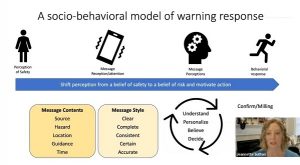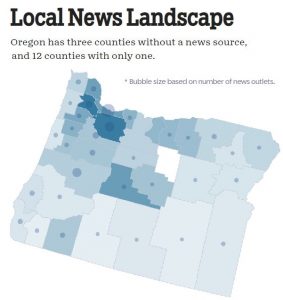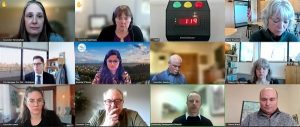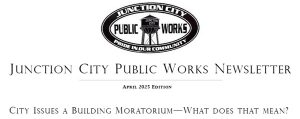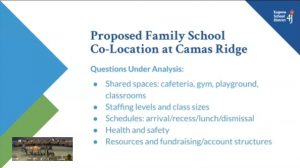Eugene City Club looks at the nation’s growing news deserts
7 min read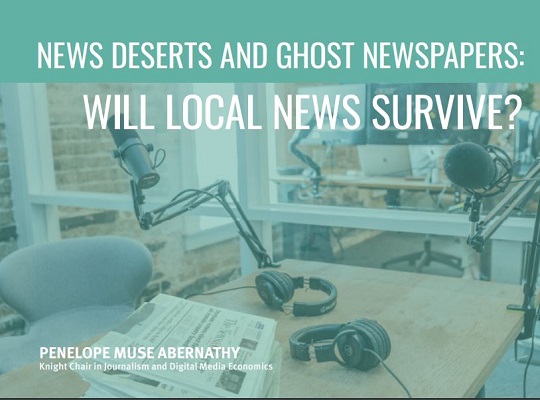
The Eugene City Club looked at the nation’s growing news deserts.
[00:00:04] Jackman Wilson: I was involved in providing local news and commentary throughout my 43-year career in newspaper journalism, mostly as editor of the Register-Guard’s editorial pages. That position no longer exists. In fact, the Register-Guard as I know it no longer exists. It’s been replaced by another newspaper with the same name.
[00:00:24] Mine is not the only job that has disappeared. And the Register-Guard is not the only newspaper that’s not what it once was: 2,500 newspapers have gone out of business since 2004 and many of those that remain are shadows of their former selves.
[00:00:41] But we don’t need to dwell on these statistics. We’ve heard them all. What we need to do now is understand the consequences of local journalism’s decline and think of ways those consequences can be addressed because the consequences are grave.
[00:00:55] Ask yourself. When was the last time a reporter attended a meeting of the Lane Education Service District, the Eugene Springfield Metro Wastewater Treatment Commission, the Lane Electric Co-op. These are hundred-million (dollar) institutions that affect our lives every day.
[00:01:12] The twilight of local news could be the dawn of a golden age for the corrupt bureaucrat.
[00:01:18] John Q: From the Highway 58 Herald, George Custer.
[00:01:21] George Custer: About a year / year and a half ago, one of the local citizens came to me and also called Doug Bates, and said, ‘There’s a problem in this town’. The local newspaper that weekly had shut down about six to eight months prior, so there was no way of disseminating news and information that was critical to the daily lives of the people in Oakridge.
[00:01:45] Well, Doug Bates took that. It was funny. He came to the first meeting a bit dubious. Came to the second meeting, and I told everybody on that third meeting when he walked in, he had this look on his face and I knew he was in. And if anybody could put this thing together quickly, it would be Doug because he knew pretty much everybody in the newspaper industry across Oregon.
[00:02:06] And we started on a shoestring—a very, very short shoestring. We looked at all the different modes, whether we should buy the local newspaper, what was remaining of it and start there, but the initial costs and the overhead, Doug quickly realized that we just couldn’t afford it. And so we decided to go with an online news source.
[00:02:28] Wasn’t sure whether we should go for-profit or nonprofit. Initially we thought, ‘Oh, for-profit.’ And then we saw after crunching the numbers, no, we can’t afford this. And so we were approved for our nonprofit status.
[00:02:43] And the reason we had to start off with little to no funds is, at the time, this person who called us together for a conference said, ‘There is something going on in City Hall,’ that she suspected was a little afoul. Strictly an opinion. And with some research, we said, ‘Well, we need to get this out to the public, because things were happening behind closed doors. We’ve got to let the people of our community know what’s happened in the local city government.’
[00:03:10] And a couple weeks later on Feb. 28 we went live, and by golly, there was an outpouring of support to attend the city council meetings and they overturned, or at least kept some dubious decisions by our city from being made. And that was our first feather in our cap. So we patted ourselves on the back and we thought, okay, we’re off and running.
[00:03:32] Well, economies of scale favor larger populations, larger newspapers, larger outlets, multiple outlets. Small towns have small businesses and even smaller advertising budget. So trying to run a newspaper in a small town with just advertising doesn’t work.
[00:03:51] A lot of them advertise on our site because they’re committed to the community. We sell more advertising by appealing to their sense of community than we do (by) what you’re going to get in revenues from your ads. So. It’s a community thing. So everybody is working in our community to try to make it happen.
[00:04:11] The Herald has to be, and that’s what I told our board of directors, that no matter what it takes, we need a form of reliable, comprehensive, unbiased, and accurate news source.
[00:04:23] And I understand economics. I’m a businessman, I understand what’s happening to the large newspapers. They’re being gutted for profit. And that’s the way our country works, but it’s been at the sake of the free press. And if you don’t have freedom of the press, you don’t have outlets, and if you don’t have watchdogs on your local government, chaos will ensue.
[00:04:45] Penny Abernathy did a study with the Medill School of Journalism: ‘Most communities that lose newspapers and do not have an alternative source of local news are poorer, older, and lack affordable and reliable high-speed digital service that allows residents to access the important and relevant journalism being produced by the country’s surviving newspapers and digital sites.’
[00:05:11] Oakridge falls right into that. We are, we’re not exactly in the dredges, but we’re a poor community. And I could see where we would be one of the first ones that drop off the list of areas of being covered. Doug, our former editor, told me that and one of the other gentlemen who was on our board for a while actually had the Oakridge desk. They lived out in Oakridge and they submitted their news to the Register-Guard. Well, those days are long, long gone.
[00:05:40] And so we’re out there. People don’t know what’s on the schedule, what kind of events are happening, what’s coming to town, how is our government acting—or reacting—on a daily basis. None of that would be available if it wasn’t for the Herald. Like I say, we’re, I call myself the interim editor because I’m sure that there’s, we’re going to eventually raise enough money to get a real journalist in there who is a lot younger and has the energy to do this.
[00:06:07] I’ll be there on the sidelines, just in case there’s a falter or a stumble. But the hard part is that, like I say, raising money and keeping rural journalism alive in small communities is a financial disaster waiting to happen. I think so many of ’em, unless they have support through combining resources.
[00:06:26] There’s it’s just a zero net game. But I’m the guy who’s going to stand between that and what needs to happen and what needs to happen is that rural journalism needs to continue.
[00:06:38] John Q: A question for Steve Forrester from Doug Bates.
[00:06:41] Doug Bates: You heard George talk about some of the discussions we had in the giving birth to the online Highway 58 Herald based in Oakridge. We rejected the idea of taking over buying the weekly print paper that went out of business.
[00:06:59] I want to know if we made a mistake. I know that the Forrester family has some pretty small papers that are still printing, and obviously must still be financially viable. So did we pick the right model or the wrong model? Will this online non-profit model, does it stand a chance?
[00:07:20] Steve Forrester: It does stand a chance for sure.
[00:07:23] John Q: The EO Group owns 16 publications in the territory, including papers in Astoria, Baker City, and Bend.
[00:07:31] Steve Forrester: You’ve made your decision and it can work. That’s what matters.
[00:07:34] We’ve recently created the Fund for Oregon Rural Journalism, and it’s a nonprofit and it has been associated with the Ford Family Foundation in Roseburg. They helped us get started. And the gist of the fund is to be able to receive philanthropic money for not just our papers, but any rural papers in Oregon. And also that we will do collaborative projects with other rural papers.
[00:08:01] John Q: One City Club member posed a question.
[00:08:04] Rajeev: Hi, my name’s Rajeev. I am a City Club member and a PhD student in Media Studies at UO. Local news closing means that local journalists are being furloughed—laid off—while corporations consolidate ownership and hedge funds strip value from news organizations.
[00:08:19] The NewsGuild, which has been effectively organizing more and more news workers across the country, is promoting legislation like the Local Journalism Sustainability Act and public funding for media as part of their Save The News campaign.
[00:08:31] So with that: For journalism to fulfill its democratic responsibility, is the future model of journalism one that has to go beyond the profit motive—toward public funding and cooperative organizational structures—where journalist workers and community members co-own and co-manage publications?
[00:08:48] John Q: We hope to follow up with Rajeev and learn more about his research.
[00:08:52] You can help support local journalism by donating to the Highway 58 Herald, or other local news organizations listed at PublicNewspapers.org.

